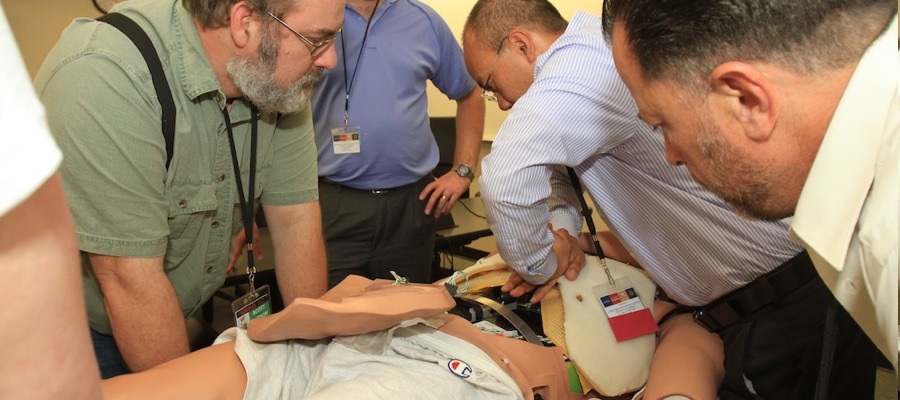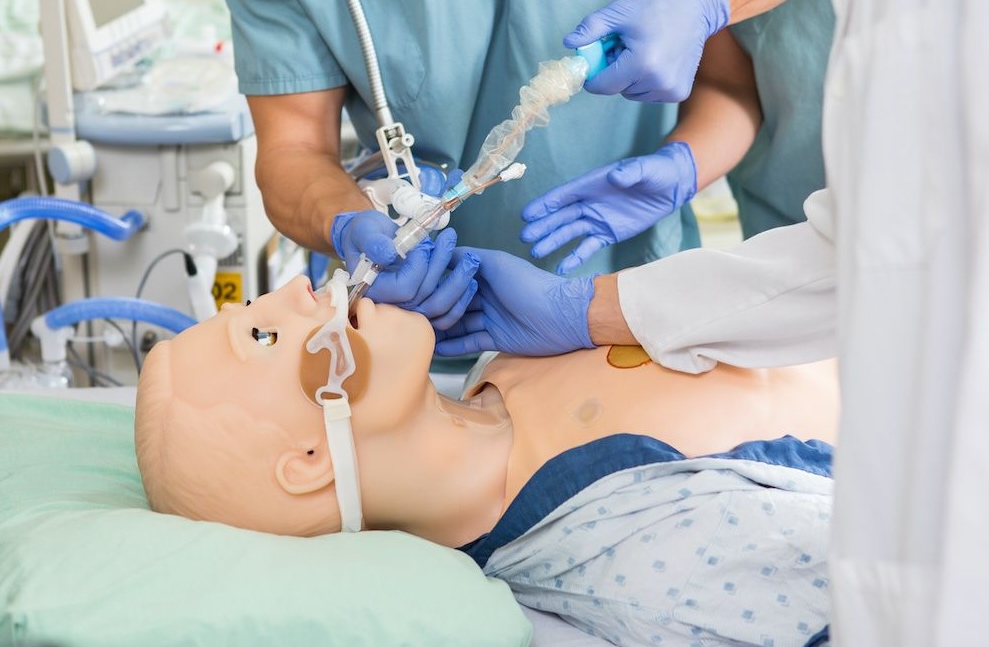Simulation technicians have an essential role in healthcare simulation education. Within a clinical simulation team, a healthcare simulation technician’s support and skill set soon become vital to assist in delivery of a successful simulated scenario. Clinical simulation technology specialists provide technical advice, expertise and support in technological and equipment areas that may not be other clinical simulation team members strengths. The purpose of this article by Erin Carn-Bennett is to explore these vital skills and how one may consider them as someone interested in the clinical simulation technician role. This article may be useful to a current clinical simulation technician to advance their skill set and create more impact in their role.
Clinical simulation technicians’ resourcefulness and knowledge base makes them an incredibly vital role within a healthcare simulation team. Simulation technicians are often in the background of clinical simulation scenarios but are a critical team member who is highly skilled in many areas. Some of the most vital skills that healthcare simulation technicians have but are not limited to include: preparation of the clinical simulation space, use of healthcare simulation equipment and the ability to problem solve any issues that occur in clinical simulation sessions.
The healthcare simulation operations specialists role has been around for some time and the career pathway is still in the development phase through a number of different entry streams. Clinical simulation technicians can enter into the space from a variety of different backgrounds such as: from clinical healthcare, IT or a variety of other work experiences.
To become a high-quality healthcare simulation technology specialist a deep knowledge of the technology and manikins used in healthcare simulation education sessions is required. As well as high-fidelity manikins this also includes but is not limited to: virtual reality (VR) simulators, all audiovisual equipment, and healthcare simulation software and their networks. Throughout any down time in between clinical simulation education sessions both maintenance of equipment and also a drive to increase knowledge base on clinical simulation equipment is an essential part of the job. Sim Techs can connect with peers and receive professional development by attending annual international SimGHOSTS events!
As a clinical simulation technology specialist other staff will come forward with a number of technical issues prior to, throughout or after healthcare simulation based education sessions are common. A can do attitude and ability to fix problems quickly and calmly is what the clinical simulation team will rely on. Be familiar with common issues that may occur with the high fidelity manikin network and also healthcare simulation equipment that is used in clinical simulations. If an issue is found ensure that this is resolved after the clinical simulation session if not in real time. Retest equipment after the resolution to be sure the technical issue is sorted prior to the next clinical simulation.
The ability to work alongside and communicate with team members is essential in healthcare simulation. In the role of a simulation technician the expectation and norm will be to work alongside a number of different multidisciplinary team members of a number of backgrounds and seniority. Comfort to share what’s happened within the simulation technician role in clinical simulation scenarios and also to prioritize the smooth delivery alongside these team members is vital. The best simulation technicians are calm and productive problem solvers who will help other team members to not panic if the clinical simulations don’t go to plan. Confidence to be able to describe challenges, successes and failures from the clinical simulation technician lens can be incredibly helpful for all team members and the clinical simulation programs growth as a collective.
The sim tech role is busy in the build up to any clinical simulation education. Preparation prior to any clinical simulation session as well as organization skills will be well served within the clinical simulation technician role. Standardized checklists are helpful to ensure that no equipment is left behind and all considerations have been made prior to set up before the simulation based education. A high level of organization and knowledge to ensure all of the manikins and equipment are charged will help the day run smoothly. When new to the clinical simulation technician role, performing a check on all equipment the day before will help to increase confidence that on the day the clinical simulation education will run smoothly.
Often within simulated clinical activities, the education session may not go to plan. Deviation from the plan or projected course can be due to a number of factors. However, as a simulation technician this is where specialized skills are priceless to determine the success of a clinical simulation based education program.
To be able to calmly respond and react to the unexpected from technology and equipment so that the other clinical simulation team members can focus on the clinical simulation participants will enable best educational outcomes. Flexibility and preparation for the unexpected in a clinical simulation technician role will assist with a best outcome for all involved in the simulated clinical activity. Not only can the technology and equipment be unpredictable but this also extends to participants and also faculty. A successful clinical simulation technician needs to feel comfortable in a response to all of these potential curve balls in their role.
Healthcare simulation is a highly innovative, creative and adaptable area to work within. Comfort with change and challenge are great skills to assist with success in transition or acceleration of excellence in the clinical simulation technician role. Clear goals for further career development and a growth mindset will serve well.
View the HealthySimulation.com LEARN CE/CME Platform Webinar Professional Development for Healthcare Simulation Operations Specialists to learn more!
A clear job description and knowledge of what the clinical simulation technology specialist role is within the organization of work will enable employees to be set up for success. Clinical simulation technicians may also hold other portfolios for example moulage within certain institutions or this may be held by other multidisciplinary team professionals.
Link and connect with product sales representatives as pre formed relationships can be useful for knowledge of what products are available on the market. The skill of establishing connections is also vital for a clinical simulation technician. These connections can assist when there are any issues with equipment or to assist in depth of knowledge base and skills required for the role.
Know about support networks available online. On Facebook there is an incredibly resourceful and useful private group called “Simulation technician network”. Conferences and also courses can be incredibly useful to advance skill sets, make new connections and to hear about what’s the latest on the international clinical simulation technician scene. Simghosts is a great network and conference to consider.
The clinical simulation technician role is often an indispensable and critical role within a clinical simulation team. Clinical simulation technicians have an incredibly broad skill set that clinical staff lean on to ensure a smoothly run clinical simulation based education session. This article has explored some of the critical elements of a clinical simulation technician and the impact that this can have on the overall delivery of a healthcare simulation program.








